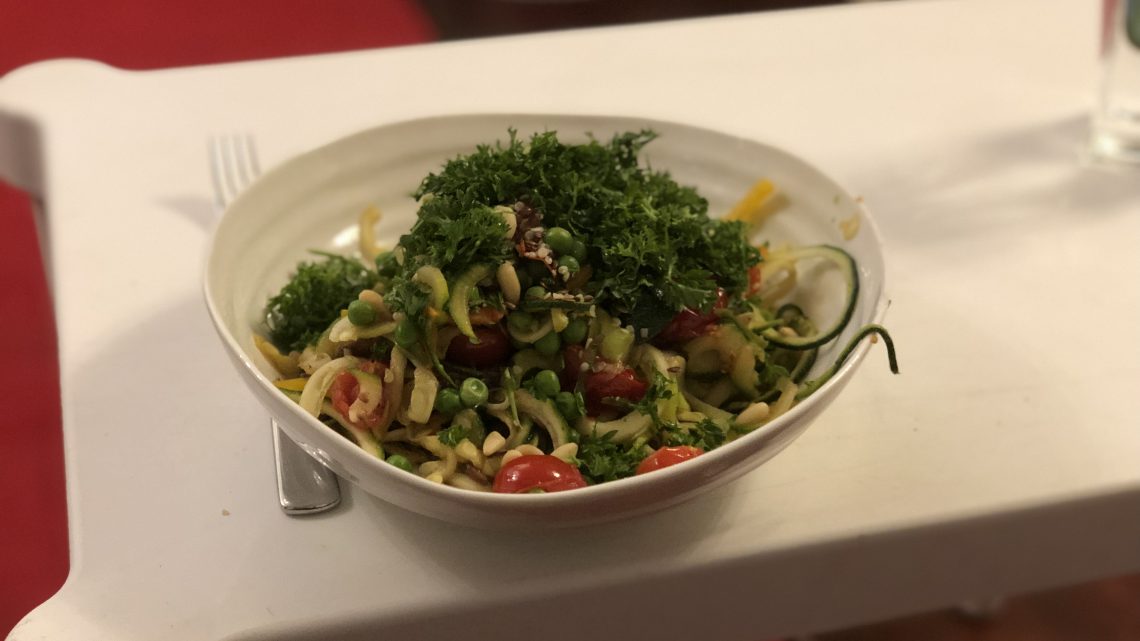
PCOS Diet
As any of you who follow me on Facebook or Instagram will have seen (apologies), we’ve changed our diet yet again in the last few weeks.
My wife has recovered well from her surgery a few weeks ago although the first two weeks were surprisingly tough. The prognosis seems to be that endometriosis was definitely present but there may still be a separate (or linked, we’re not sure) issue of Poly-Cystic Ovary Syndrome (PCOS). This wouldn’t explain the period pain but may explain some of the fertility issues we’ve had and the length and unpredictability of the period cycles. It also comes with some of its own concerns about further health complications such as diabetes and blood pressure, although I don’t think anyone is suggesting she’s at sudden risk of these if the PCOS diagnosis is correct.
There are various treatments and next steps for my wife to consider but in the meantime there is quite a bit of evidence to suggest that diet is one of the best mitigating solutions. As a result, my wife – and therefore to an extent I – have changed what we are eating. Specifically to a diet that minimises inflammatory foods. It’s worth pointing out that I’m not an expert in this and we’re learning what this means as we’re going along but in short it means cutting out (or at very least minimising) the following:
- Processed foods – this covers a fairly broad area but specifically bacon, low meat-content sausages, highly processed breakfast cereals, breads etc… (you’ll notice that quite of few of these are removed for other points on this list as well)
- Refined Carbohydrates – PCOS seems to be linked to insulin resistance with the body creating higher levels of insulin leading to increases of testosterone and other androgens (often called the male hormones but are equally present in women and perform over 200 actions in the female body). Starchy and sugary foods cause sudden spikes in blood sugar levels and require insulin to re-balance. Removing these food types can help keep the levels of androgens low(er). This means cutting out white bread, pasta, white potatoes etc…. Basically many of the comfort foods. My wife had removed gluten for some time now, this is just the next level up really.
- Certain fats. Effectively cholesterol is a key factor in how fat tissue regulates your hormones. It seems like women with PCOS have subtle differences in how their fat tissue responds. As a result it’s important to get the right mix of cholesterol, specifically enough omega-3 fatty acids and not too many omega-6 fatty acids. The latter is prevalent in western diets from vegetable oils but the former can be difficult to get. An imbalance can cause inflammation which is a problem for hormonal health. Limiting vegetable oils (sunflower, rapeseed, for example) and replacing them with coconut oil and olive oil can help.
- Cows Milk: The lactose in milk is a sugar and impacts your insulin levels in a similar way to refined carbohydrates. As such, many PCOS diets suggest removing milk. Obviously for us that hasn’t been a problem as we’ll all been off it for years now. However, something I learnt recently that I didn’t know before is that butter is actually not that bad for PCOS and the reason is that it’s very low in lactose. Considering that butter-rich croissants were the item that helped me realise I was struggling with milk, that effectively proves that I have an allergic reaction to the milk protein rather than a intolerance to the lactose. For those who aren’t allergic to milk, butter can be a good source of appropriate fats despite the common conception that milk and PCOS don’t mix well.
- Soya. Luckily this isn’t an issue we’ve had to deal with either but soya contains vegetable oestrogen which can trick the body into thinking it doesn’t need to produce its own. Many people switch from cow’s milk to soya when they start a PCOS diet unaware that this has its own problems. Here seems like a good moment to share a link to my review of milk alternatives, if you’re looking.
- Missing Sleep also affects hormones and a lack of it can cause a spike in blood sugar levels. A good night sleep can be part of a positive change towards helping reduce the symptoms of PCOS.
Coincidentally, and I didn’t realise this when I started writing this blog, it’s PCOS awareness month this month (September). Also my wife has been following a 30-day challenge that helps to plan meals (built up from simple introductions at first) and also creates an online community. You can find the details here if you’re interested. https://www.smartfertilitychoices.com/free-30-day-pcos-diet-challenge/
My wife is trying to make these changes – fairly aggressively at first as that way we can see if it makes a difference – we’ll see in time whether we stay at that level or make a more moderate change longer term. It’s not been easy and we had a massive clear out of all the foods we really shouldn’t be eating (and I’m unlikely to cook for myself alone). It’s amazing what you find sugar and rapeseed oil in when you start looking for it. Gluten-free gravy granules, for example, I had no idea contained sugar.
Naturally it’s made it difficult to eat out and particularly in these early stages we’re trying hard to stick to the diet as much as we can. I suspect in time we’ll begin to find acceptable compromises to avoid it taking over our lives; although we both agree that it’s important to understand the scale to which it makes a difference first. I’ll admit that I’ve been a bit grumpy at some of the changes this has had to mean for everyday foods that I hadn’t realise wouldn’t work. I feel guilty about this and I have to remind myself that my wife doesn’t really want to be making these changes either (as she’d rather she didn’t have to). But I’ve also tried to get creative about coming up with side dishes that help to remove carbohydrates. I’ve got pretty good at sweet potato wedges coated in gram flour if i do say so myself.
I am finding some clear benefits myself. My sugar reduction is so noticeable (both as a result of my reduced calorie diet and trying to cook a PCOS diet for my wife) that I have found appreciation for things I never really liked. My enjoyment of fruit has gone up ten-fold and can enjoy strawberries and nectarines, in particular, in ways I never did before. Foods that I never even considered sweet before are suddenly treats to the senses! It’s worth pointing out that my wife has to limit sweet fruits to only a couple of portions to avoid negating the benefit of not eating refined carbs. I on the other hand find I can eat quite a lot of fruit towards my daily calorie totals without exceeding my sugar levels (because I’m not eating much elsewhere).
We’ve also stumbled across somethings that I would never have previously thought to eat. It turns out that I quite like the flavour of buckwheat and we have been making buckwheat and apple bread (much, much better than it sounds). We’ve also used it to make pancakes, which worked much better than the ground almond and flaxseed ones we tried. We’ve also bought a spiralizer and I’ve found that replacing pasta with lightly fried strands of courgette works really well. We made an anchovy ‘pasta’ with garlic and herbs and tomatoes using 1.5 courgettes per person and it was delicious. We’ve even had steak and eggs for breakfast a couple of times which I could definitely get used to!
The various diet adjustments certainly seem to be working for me. I feel more motivated, much less lethargic and even more confident. The weight loss is working too. I never weighed myself at the beginning and I haven’t weighed myself now but I can clearly see that I’ve lost a fair amount of weight. Suddenly the shirts that I was about get rid off because I’d never really fit into them are the only ones that look semi-decent any more. My work trousers and my (more generous) work shirts seem to be hanging off me! I even treated myself to a slim fit T-shirt the other day; I’ve wanted a plain white T-shirt with a slim silhouette for years but I’ve never been happy with how they looked until now. I even ended up buying the next size down. The progress seems fairly sudden considering a few weeks ago I wasn’t sure how much progress it looked like I’d made, but I’m comfortable that I’ve done it in a healthy way. I’m not cutting anything out of my diet entirely (aside from milk, obviously!), I’m just trying to make sure that each day is approached in moderation; aiming for ~1800 calories but not giving myself too hard a time when it ends up being unrealistic. I think I’m still a bit above the weight I’d ideally like to be but fairly soon I’ll have to change to find a sort of equilibrium rather than specifically targeting weight loss.
I suspect the coming weeks will throw up a few challenges. It’s proving difficult to think creatively about all the different meals we can have, especially now my wife’s teaching term has started again and I’m finding work unusually high pressured at the moment (we’re getting near to finding out whether my job is secure or not – I should know by the end of the month). That said, my wife has a couple of apps and online books that are great at suggesting a meal you can cook at the weekend and then the appropriate ways to rehash that into other meals for the week. Lunches are the hardest thing because we need to make our own every day. But we seem to have found variations of quinoa salads and carrot and cabbage salads that can accompany chicken or salmon for lunches. It’s expensive too as you begin to realise why we fill so much of diets with cheap, filling carbs. Potatoes, bread, pasta are all really cheap compared to the high protein or fresh vegetable alternatives. Or can be, at least. I suspect we’ll get better at that in time.
Well its late and I should probably be getting sleep myself to help regulate my own hormones. It doesn’t seem fair that my wife should have to cope with mine if she’s already coping with her own. Fingers crossed it works. It’s early days but there already seem to have been some improvements – we’ll have to wait and see…
Toodlepips
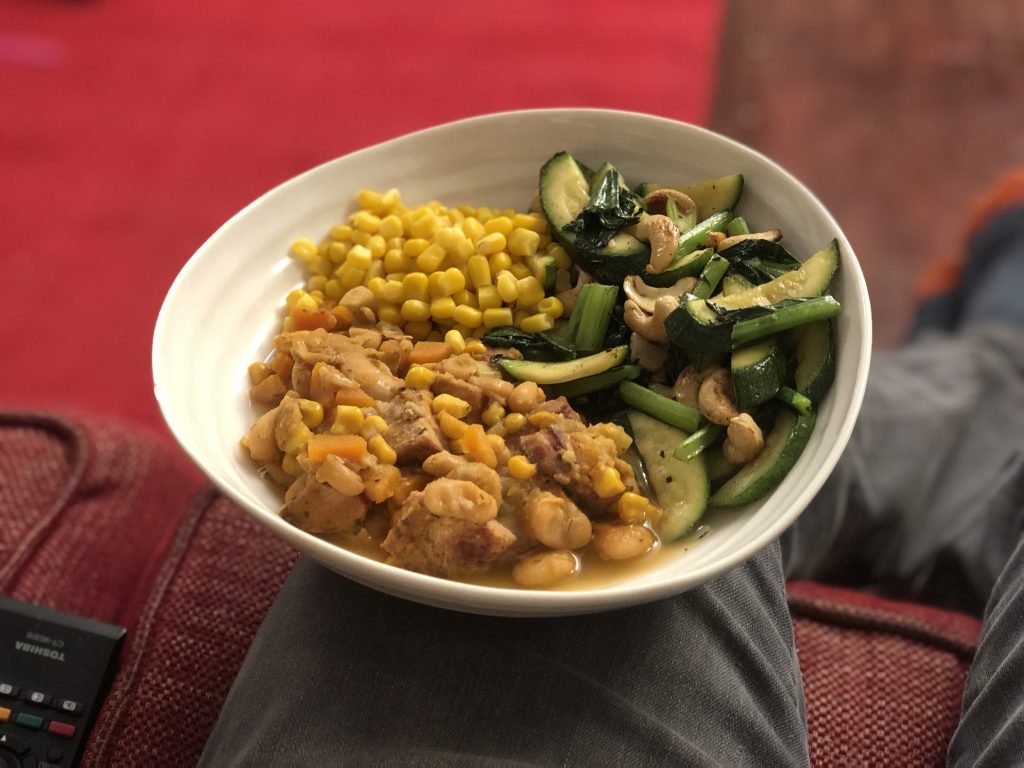
Pork casserole with cashew and choi sum stirfry 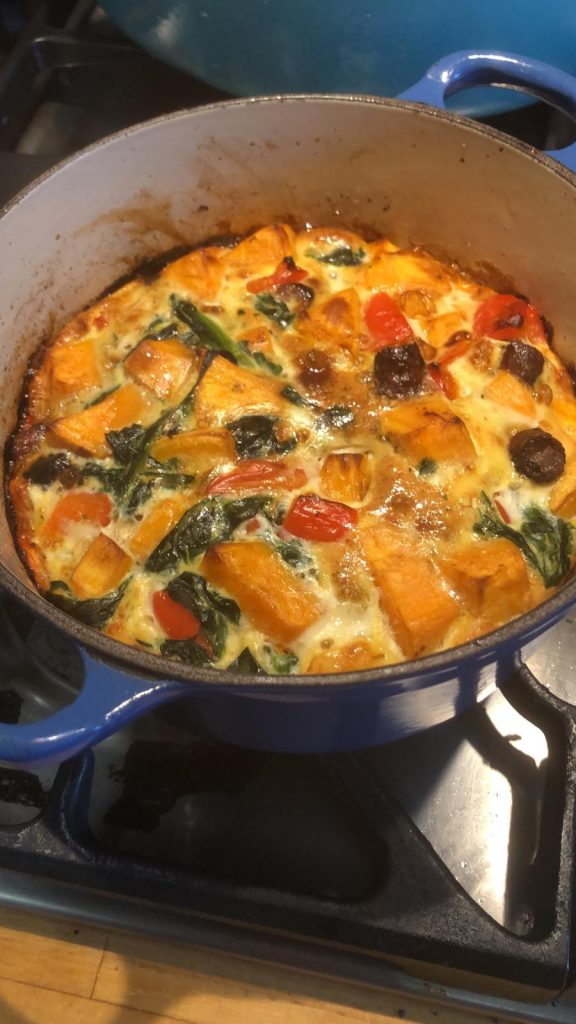
Fritatta with high-pork, no-sugar sausages 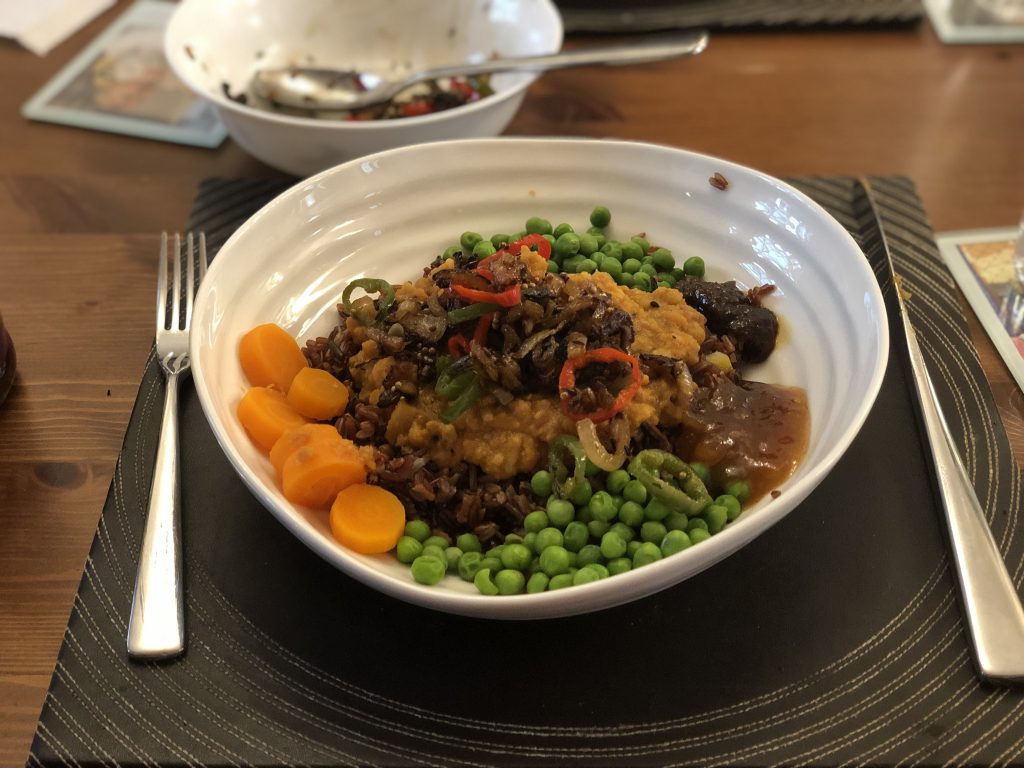
Vegetable dhal and red and black rice (no mango chutney for my wife) 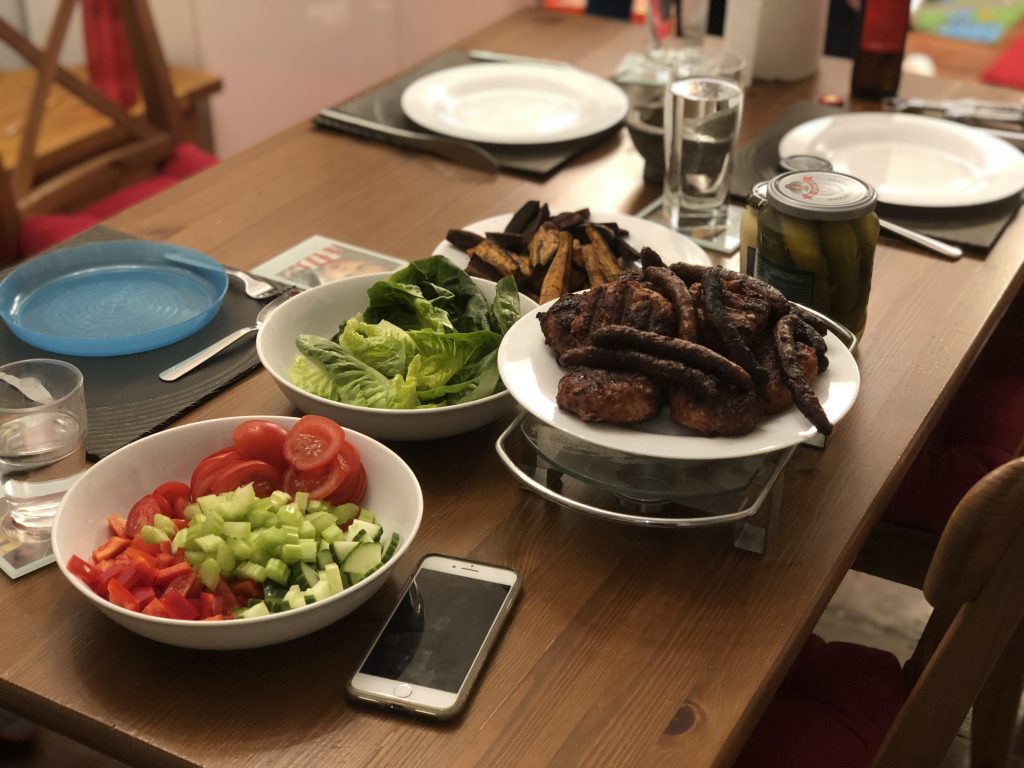
BBQ’d pork burgers with salad 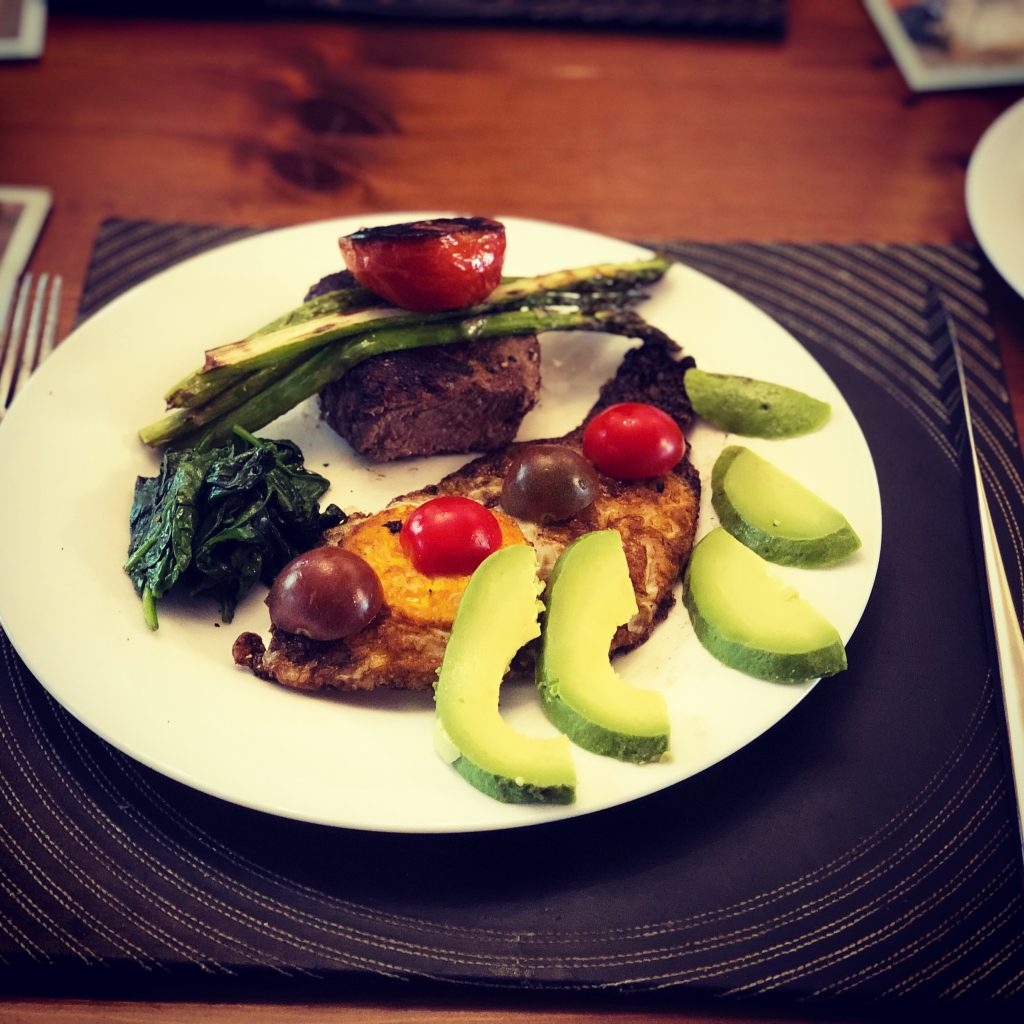
Breakfast of kings: steak, egg, asparagus, avocado and spinach 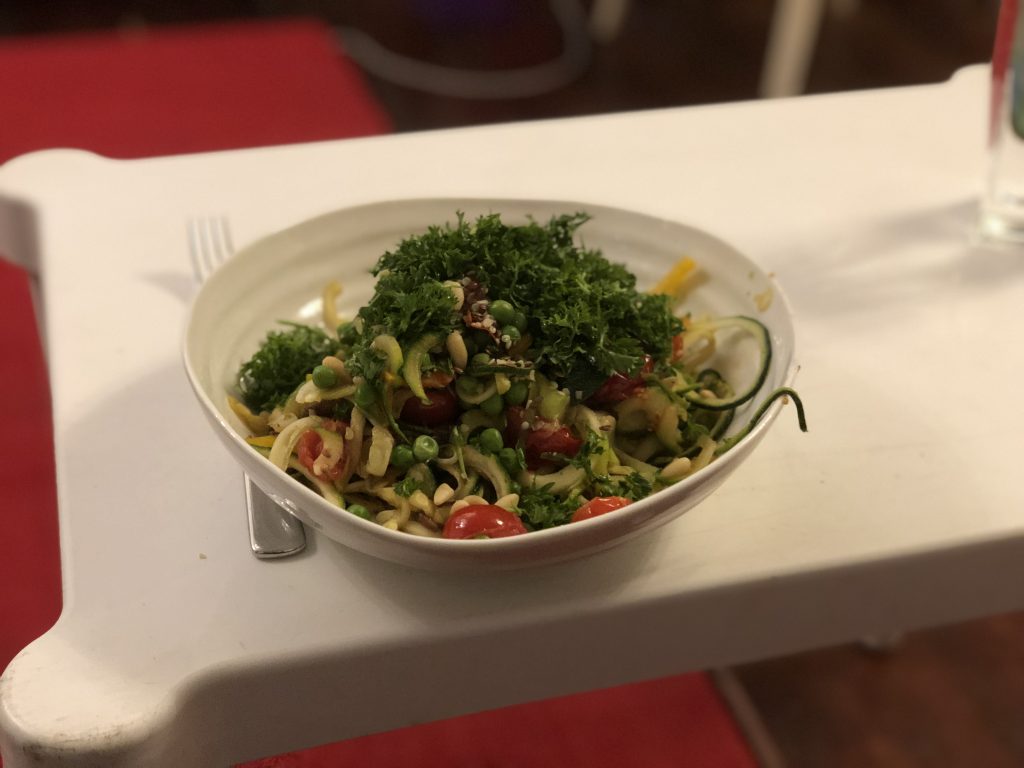
Spiralized courgetti pasta with anchovies 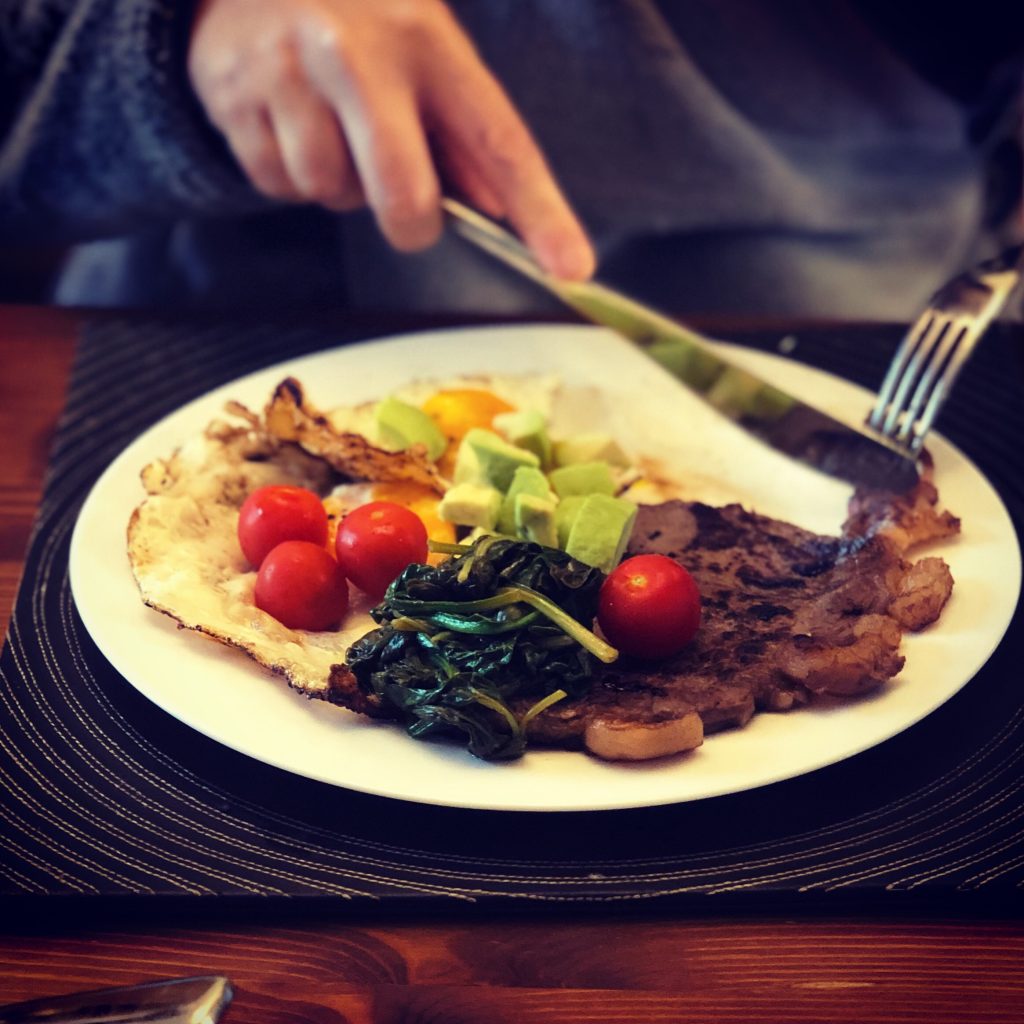
The first pass at steak and eggs 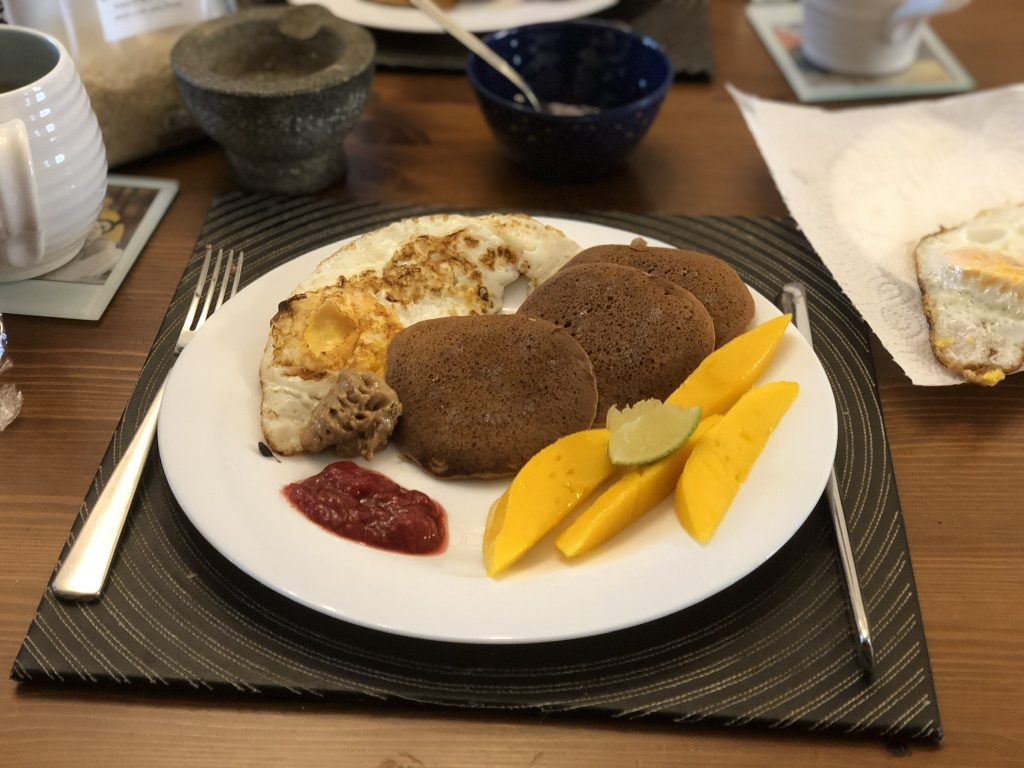
Buckwheat pancakes